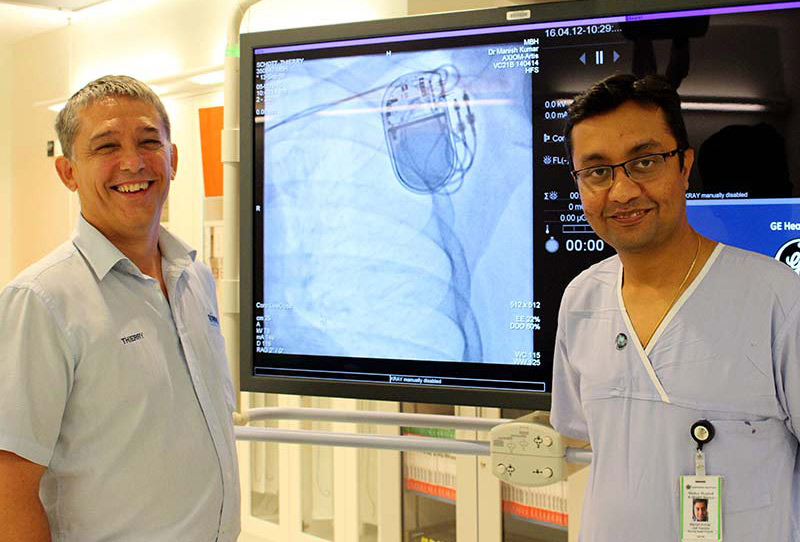Mackay Base Hospital is setting the pace for regional cardiac healthcare with more than 1700 investigations and procedures performed in two years.
Chief Executive Clare Douglas said opening the Cardiac Catheter Laboratory in February 2014 had made a real difference for many Mackay HHS residents.
“We have only had to transfer 61 patients to The Townsville Hospital for care since the Cath Lab opened – well down from an average of 300 a year before it opened,” Ms Douglas said.
“This is not only better for patients to be treated closer to home, it has made financial sense with the health service saving more than $11 million by not having to transfer patients.”
The Cath Lab has recently added permanent pacemaker insertion to the list of interventions offered with 63 people so far receiving the life-saving device.
Cardiologist Dr Manish Kumar said offering pacemaker and loop recorder insertion was a milestone in the growth of cardiac services at Mackay Base Hospital.
“A pacemaker can really improve the quality of life for patients experiencing a slow, irregular heart rhythm and we are very excited to reach this milestone,” Dr Kumar said.
“Although it is a quite invasive procedure, pacemakers and loop recorders can be done in a short amount of time. We are performing both procedures on a weekly basis averaging approximately six per month,” he said.
Ms Douglas said the health service was excited to offer such a comprehensive cardiac service to the community.
“Offering these services locally mean patients won’t need to travel to Townsville and Brisbane to undergo procedures and we know our patients and their families appreciate this.
“Staff in the Cardiac Catheter Lab are highly commended for their efforts that have helped get us to this point,” she said.
Dr Kumar said patients were given full support ensuring a speedy recovery.
“Prior to the procedure all patients are walked through a pre-assessment where we go over everything that is going to happen,” Dr Kumar said.
“After the procedure, check ups are scheduled regularly at one month, six month and 12 month intervals. Follows ups are performed annually after that to make sure the patient is doing well.
“We have received wonderful feedback from all of our patients that are happy with the results and none facing post-procedure difficulties.”
Services offered in the Cath Lab:
Coronary angiograms: A coronary angiogram is a special x-ray of the heart using an injected contrast dye to look for heart muscle or valve abnormalities and can also see if the arteries are narrowed or blocked.
Percutaneous Coronary Interventions (PCI): During a PCI a thin flexible tube is fed into a heart artery and a balloon is inflated to open the blocked artery. In some patients a small tube shape metal structure called a stent is inserted to ensure the artery remains open.
Implantable Cardioverter Defibrillators (ICDs) Deliver two levels of electrical energy: one to convert a beating heart that is in an abnormal rhythm back to a normal heartbeat, and another that is delivered when the heart is only tremoring instead of beating.
Permanent pacemakers: Create a precisely timed, electrical impulse for each beat when the heart’s own specialised pacemaker cells are not working well enough. This impulse creates a synthetic ‘heartbeat’ which tells the heart muscle to constrict and ensures that the body receives the blood it needs.
Loop recorders: Are implanted into patients to record cardiac rhythms and diagnose irregularities that may need treatment.
More Information
Danielle Jesser, Media and Communications Manager
mhhs-comms@health.qld.gov.au
Phone 0417 756 221



